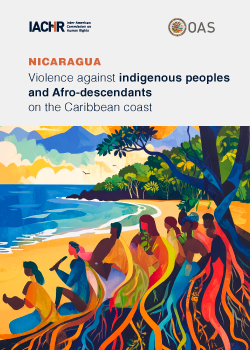
Press Release
IACHR publishes report on violence against Indigenous peoples and people of African descent on Nicaragua’s Caribbean Coast
October 30, 2025
Contact info
IACHR Press Office
Distribution List
Washington, DC—The Inter-American Commission on Human Rights (IACHR) has published a new report, “Violence against indigenous peoples and people of African descent on Nicaragua’s Caribbean Coast”. The publication analyzes the violence these groups are experiencing and its impact on their human rights. Based on a long-term view reaching back to the 1980s, the IACHR documents a pattern of violence, dispossession of lands, and cultural assimilation that is part of the longstanding discrimination against and exclusion of Indigenous peoples and people of African descent in Nicaragua. These conditions have worsened under the government of Daniel Ortega.
According to the report, the violence occurring on the Caribbean Coast is not an isolated phenomenon. Instead, it stems from actions and omissions on the part of the State that have enabled lands and natural resources belonging to Indigenous communities and people of African descent to be appropriated and exploited, benefitting both the Ortega-Murillo regime and private industries. In the publication, the IACHR highlights how widespread corruption, the installation of parallel authorities, and the dismantling of the regional autonomy model have favored land invasion and forced occupation. The militarization of the region, the permissive attitude of State security forces toward acts of violence under the Ortega-Murillo regime, and their direct involvement in repression further reveal a pattern of State acquiescence.
A key factor in the spread of armed groups and the violent occupation of Indigenous lands has been the State’s failure to implement effective land titling and saneamiento (a legal process to evict illegal occupants of Indigenous territories). Since this process was suspended in 2014, the IACHR has documented an alarming increase in the scale and intensity of violence in the region. Between 2020 and 2024 alone, at least three large-scale armed attacks have taken place, described by the communities themselves as massacres.
The IACHR has identified a series of patterns of violence targeting these groups, including armed attacks carried out by settlers and organized criminal groups that are tolerated or supported by the State; killings; the criminalization of traditional authorities, community leaders, and land defenders; threats, harassment, and extortion targeting entire communities; and acts of torture and sexual violence. These violations persist amid widespread impunity and the Executive’s total control over the country’s institutions.
In response to these acts of cruelty and the growing intensity of the violence, the IACHR and the Inter-American Court of Human Rights have granted protective measures to more than 15 communities that have been targets of violent aggression, as well as to Indigenous rights defenders, arbitrarily detained forest rangers, community leaders, journalists, and media workers at risk. The granting of these measures, which the State has failed to comply with, is testimony to the gravity and urgency of the situation, which is ongoing.
The report notes that the extreme vulnerability of Indigenous peoples and people of African descent has intensified in the context of the broader human rights crisis that began in Nicaragua on April 18, 2018, with the creation of a system in which all power is concentrated in the hands of the Executive. The constitutional reforms adopted in 2024, which eliminated democratic safeguards and now threaten the system of regional self-government, represent a profound setback to the advances that had been achieved decades earlier in recognition of the rights of Indigenous peoples and people of African descent in Nicaragua.
The IACHR concludes that their physical and cultural survival is at serious risk. Armed settler violence has led to the dispossession and displacement of ancestral lands, jeopardizing their collective existence and the survival of their culture. These territories are not only where these communities live—they are the foundation of their traditional knowledge, ways of life, spirituality, and worldviews. In this regard, territorial dispossession and forced displacement constitute violations of these peoples’ right to cultural identity and collective property.
The report reaffirms that Indigenous peoples and people of African descent are central to Nicaragua’s cultural diversity. Protecting them from colonization, cultural erasure, and forced assimilation is a binding legal obligation under international treaties and declarations to which Nicaragua is a party, including ILO Convention 169, the American Declaration, and the UN Declaration on the Rights of Indigenous Peoples.
The State of Nicaragua must ensure these peoples’ right to live freely on their lands according to their worldviews, governance systems, and cultures. These conditions are essential to their survival as collective rights-holders. The State must also guarantee their safe and dignified return to traditional lands. In cases of forced displacement due to violence, this entails taking measures to combat the impunity of those responsible.
Based on the report’s findings, the IACHR is issuing a series of recommendations to the State. It also calls on the international community to play a part in ending repression in Nicaragua. In particular, the IACHR urges international financial institutions to make the approval of loans or development financing conditional on the State making steps toward restoring the rule of law. It further calls on States where livestock, agribusiness, logging, and mining companies are headquartered to implement oversight and regulation of their companies’ operations abroad, in line with international human rights standards.
The IACHR is a principal and autonomous body of the Organization of American States (OAS), whose mandate stems from the OAS Charter and the American Convention on Human Rights. The Inter-American Commission has the mandate to promote the observance and defense of human rights in the region and acts as an advisory body to the OAS on the matter. The IACHR is made up of seven independent members who are elected by the OAS General Assembly in their personal capacity, and do not represent their countries of origin or residence.
No. 220/25
11:00 AM


